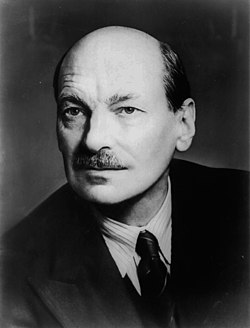5 July 1945 | |||||||||||||||||||||||||||||||||||||||||||||||||
All 510 English seats in the House of Commons 256 seats needed for English majority | |||||||||||||||||||||||||||||||||||||||||||||||||
|---|---|---|---|---|---|---|---|---|---|---|---|---|---|---|---|---|---|---|---|---|---|---|---|---|---|---|---|---|---|---|---|---|---|---|---|---|---|---|---|---|---|---|---|---|---|---|---|---|---|
| |||||||||||||||||||||||||||||||||||||||||||||||||
The 1945 United Kingdom general election was held on Thursday 5 July 1945 to elect 640 members of the House of Commons, of which 510 constituencies were in England. It was the first general election held since the conclusion of the Second World War and nearly 10 years since the last general election in November 1935. It led to the first majority victory of the Labour Party in the House of Commons and England. It was also the first time that the Labour Party won the popular vote in any general election in England as well as the nation. Conversely, it was the first election since 1906 that the Conservative Party did not win the largest share of votes in the nation as well as England. For the rest of the 20th century, the Labour Party would win a majority of seats in England only in the 1966 and 1997 elections.
Contents
The 331 seat tally of the Labour Party remained the highest number of seats it ever won in England until the 2024 general election under Sir Keir Starmer. The voteshare of Labour in England has been exceeded only once since then - in 1951. [2] [3] [4]


